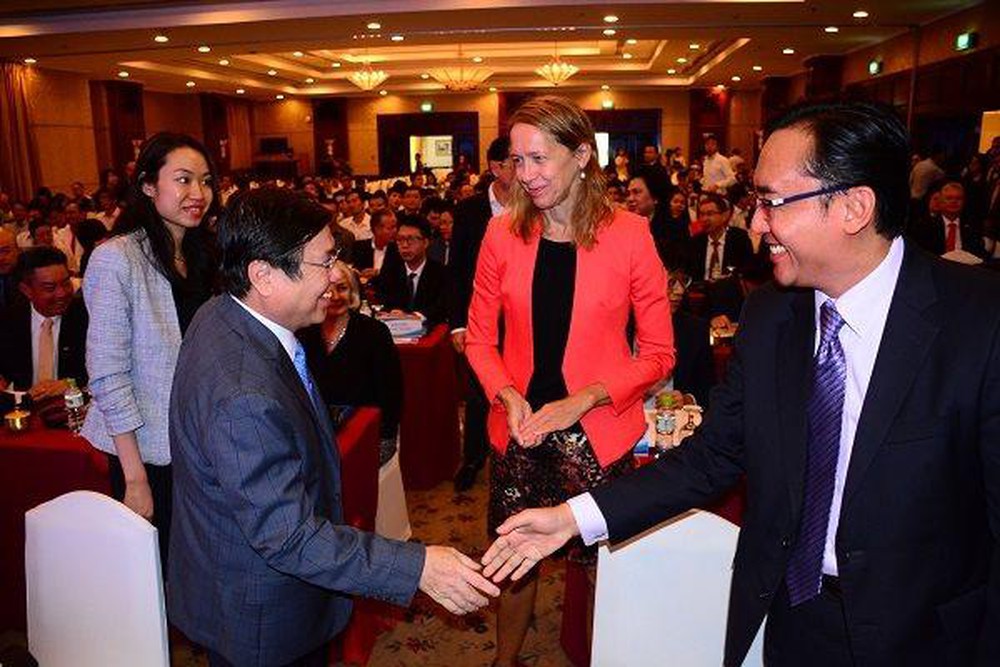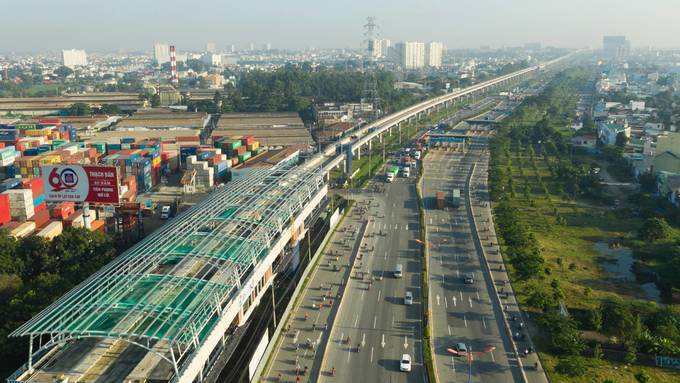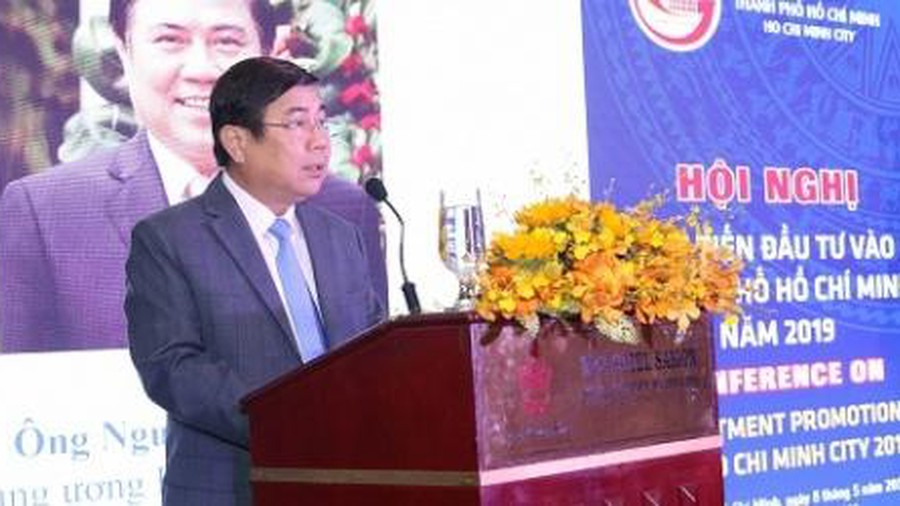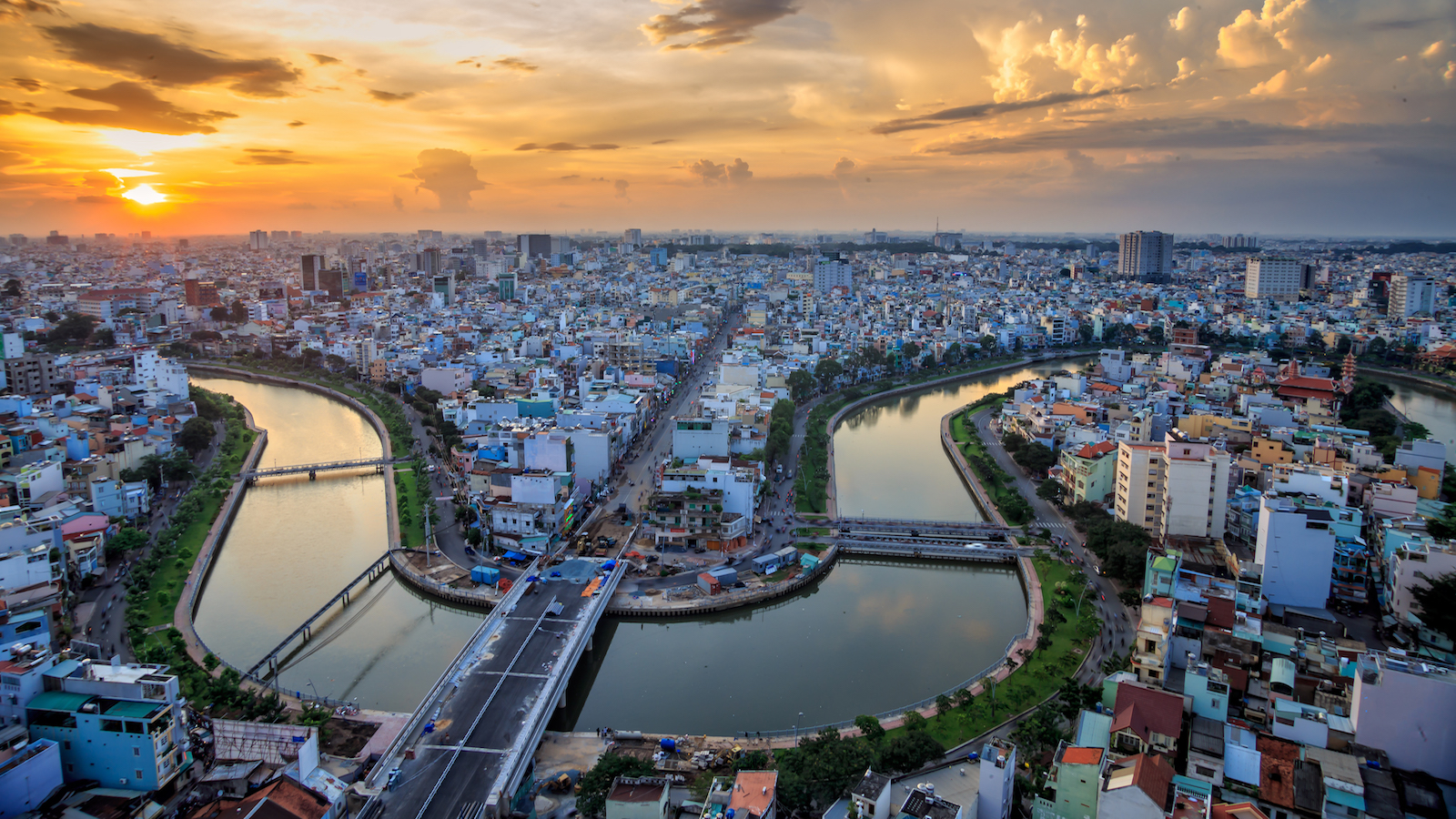
HCMC Chairman Nguyen Thanh Phong (L) talks to some representatives at the conference on May 8. The city has 210 projects across multiple fields in need of investment. (Photo: Nhat Linh)
Ho Chi Minh City has invited investors to join 210 projects with total capital of VND1,200 trillion (US$53.8 billion), local media reported.
Projects on the offer are in fields of transport infrastructure, infrastructure development, agriculture, trade – service, urban development, education, healthcare, culture – sport, and tourism – entertainment.
The proposal was made at Ho Chi Minh City’s investment conference held on May 8.
Of the 210 projects, the four fields that have the largest needs of capital include transport with 85 projects worth US$41.9 billion, infrastructure with 36 projects for US$4.9 billion, urban development with 29 projects for US$2.1 billion, and culture – sport with 15 projects worth US$3.1 billion.
Some big local and foreign investors have expressed their keen interest in these projects.

Developing transport infrastructure in Ho Chi Minh City needs about $41.9 billion of investment.
Nguyen Thien Nhan, secretary of the city’s Party Committee, said the city would include an addition of 1,000 hectares into planning for industrial parks, targets to maintain the contribution rate of 27 – 28% to the state budget and annualized GRDP growth rate of 8.3 – 8.5%.
Additionally, Nhan added Ho Chi Minh City would give priority to projects using new technologies, transferring technologies to local companies, investing in R&D and technical infrastructure development.
Nguyen Thien Nhan said that the city will continue to increase the land areas for industrial production in order to attract more foreign direct investment.
To become a smart city, Ho Chi Minh City is in the process of developing four centers, including a shared database and open data ecosystem, socio economic forecast and stimulation, smart urban management and information safety.
Nhan said the city is committed to initiating dialogue with enterprises and citizens in a yearly basis, and acknowledges inadequate transport infrastructure being a major issue for economic development.
According to Nhan, Ho Chi Minh City serves as a gateway for multinationals to get access to the Southeast Asian market with dynamic and diversified socio-economic environment.
In addition, the city will renew mechanisms to promote innovation and use resources in a more effective way, Nhan noted.

Chairman of Ho Chi Minh City People’s Committee Nguyen Thanh Phong speaking at the conference. (Photo: kinhtedothi.vn)
Speaking at the Conference, Chairman of Ho Chi Minh City People’s Committee Nguyen Thanh Phong emphasised that Ho Chi Minh City is one of the leading localities with high GDP growth rate, contributing approximately 22% to the national GDP each year. The city also contributes one third to the national industrial output, one third to the State budget revenue and one fourth to the nation’s export revenue.
As many as 101 countries and territories had invested in 8,112 projects in the city, with a total registered capital of US$44.94 billion by the end of 2018, which was an encouraging result amid enormous challenges facing the world economy, Phong said.
Chairman Phong affirmed that the city leaders appreciate the contributions of domestic and foreign investors and are committed to do their utmost to ensure a stable political and social environment, the legitimate rights of investors, and facilitate enterprises to operate in the city.
He noted that transport is a bottleneck to the municipal economic development, requiring investment in transport projects in the public-private partnership (PPP) model.
In addition, the city also needs investment in the areas ofinfrastructure, agriculture, commerce-services, education,health, and culture-sports.
In 2018, total FDI commitments to Ho Chi Minh City reached US$7.07 billion, up 7% year-on-year and accounting for 22% of total investment in the country. The city came second nationwide with US$2.37 billion or 16.3% of the total investment in the first four months of 2019, behind Hanoi with US$4.47 billion, which accounted for 30.6% of the total.

(Illustrative photo)
Harold Chen, vice president of Alpha King Real Estate Development, expected Ho Chi Minh City authorities to give his firm the permission to carry out research and investment in a skyway project.
Chen revealed that Build Your Dream Company Ltd., which is Alpha King’s partner in Vietnam, invested US$800 million and mobilized more than 1,000 engineers to work on a research and development project lasting five years to develop a monorail transit system, BYD Sky Rail.
BRG Group Chairwoman Nguyen Thi Nga pointed out that the tourism, hotels and entertainment sectors in HCMC have great potential for growth. It is necessary to further invest in these fields, she added.
Nga said BRG was developing a handful of hotel and office projects in the city, including Hilton Garden Inn, Crowne Plaza, Diamond Complex, which it has acquired over the last few years.
BRG is also studying opportunities to develop a recreation complex in Hoc Mon district and a Hello Kitty park.
Le Hoang Chau, chairman of the Ho Chi Minh City Real Estate Association, said while the scale of Vietnam’s real estate market has doubled over the past decade, it has not been able to meet the actual demand.
What’s more, the city is facing serious issue of overloaded urban infrastructure, traffic jams, and environmental pollution.
“The association and property firms showed great interest in 85 traffic infrastructure projects, 36 urban infrastructure projects, 29 urban embellishment projects and nine commerce and service projects among the 210 projects presented by the municipal government for investment,” Chau said.
Apart from the official discussion session, the conference featured two direct discussion sessions between departments, related units and investors.


















